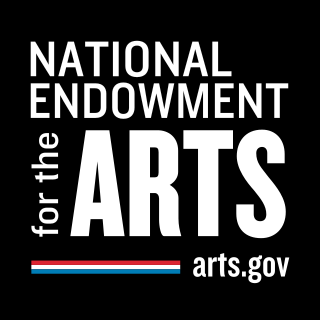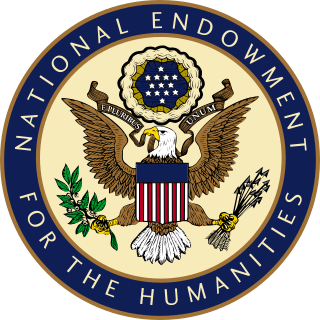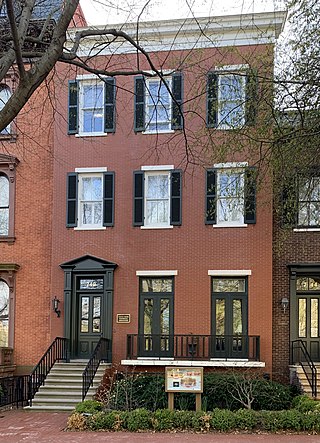
The National Endowment for the Arts (NEA) is an independent agency of the United States federal government that offers support and funding for projects exhibiting artistic excellence. It was created in 1965 as an independent agency of the federal government by an act of the U.S. Congress, signed by President Lyndon B. Johnson on September 29, 1965. It is a sub-agency of the National Foundation on the Arts and the Humanities, along with the National Endowment for the Humanities, the Federal Council on the Arts and the Humanities, and the Institute of Museum and Library Services.

The National Endowment for the Humanities (NEH) is an independent federal agency of the U.S. government, established by the National Foundation on the Arts and the Humanities Act of 1965, dedicated to supporting research, education, preservation, and public programs in the humanities. The NEH is housed at 400 7th St SW, Washington, D.C. From 1979 to 2014, NEH was at 1100 Pennsylvania Avenue, N.W., Washington, D.C. in the Nancy Hanks Center at the Old Post Office.

The National Medal of Arts is an award and title created by the United States Congress in 1984, for the purpose of honoring artists and patrons of the arts. A prestigious American honor, it is the highest honor given to artists and arts patrons by the United States government. Nominations are submitted to the National Council on the Arts, the advisory committee of the National Endowment for the Arts (NEA), who then submits its recommendations to the White House for the President of the United States to award. The medal was designed for the NEA by sculptor Robert Graham.

Francis Samuel Monaise "Frank" Hodsoll was an American historian. He was the fourth chairman of the National Endowment for the Arts. He was appointed by President Ronald Reagan and served from 1981 to 1989.

The Office of Science and Technology Policy (OSTP) is a department of the United States government, part of the Executive Office of the President (EOP), established by United States Congress on May 11, 1976, with a broad mandate to advise the President on the effects of science and technology on domestic and international affairs.

Counselor to the President is a title used by high-ranking political advisors to the president of the United States and senior members of the White House Office.

The Institute of Museum and Library Services (IMLS) is an independent agency of the United States federal government established in 1996. It is the main source of federal support for libraries and museums within the United States, having the mission to "create strong libraries and museums that connect people with information and ideas." In fiscal year 2015, IMLS had a budget of $228 million. It is a sub-agency of the National Foundation on the Arts and the Humanities, along with the National Endowment for the Arts, the National Endowment for the Humanities, and the Federal Council on the Arts and the Humanities.

The U.S. Commission of Fine Arts (CFA) is an independent agency of the federal government of the United States, and was established in 1910. The CFA has review authority over the "design and aesthetics" of all construction within Washington, D.C. In accordance with the Old Georgetown Act, the CFA appoints the Old Georgetown Board. The Old Georgetown Board has design review authority over all semipublic and private structures within the boundaries of the Georgetown Historic District. The CFA was granted approval authority by the Shipstead-Luce Act over the design and height of public and private buildings which front or abut the grounds of the United States Capitol, the grounds of the White House, Pennsylvania Avenue NW extending from the Capitol to the White House, Lafayette Square, Rock Creek Park, the National Zoological Park, the Rock Creek and Potomac Parkway, Potomac Park, and the National Mall and its constituent parks.

The White House Historical Association, founded in 1961 through efforts of First Lady Jacqueline Kennedy, is a private, non-profit organization that works to preserve the history of the White House and make that history more accessible to the public. As of March 2022, the president of the association is Stewart McLaurin.

Preserve America is a United States government program, established under President George W. Bush, intended to encourage and support community efforts to preserve and enjoy the country's cultural and natural heritage.

Megan Carroll Beyer is an American journalist, activist, and lifelong advocate of women’s rights and gender issues. Beyer is the Director of the Office of Art in Embassies at the U.S. Department of State, appointed by President Joe Biden in 2022. She has served as an advisor to many arts and civic organizations, including Civic Nation, the American Film Institute, and the Better Angels Society.

Rachel Eva Goslins is an American arts administrator and documentary film director and producer. In August 2016, she was appointed director of the Smithsonian's Arts and Industries Building. She was previously head of the President’s Committee on the Arts and the Humanities.

The Chair of the National Endowment for the Humanities (NEH) is the executive leader of the National Endowment for the Humanities, an independent federal agency created in 1965. The Chair directs the NEH and is the sole position in the agency with the legal authority to make grants and awards. The NEH Chair is appointed by the president and confirmed by the Senate. The appointment and term of the Chair are statutorily defined in 20 U.S.C. § 956(b), and the Chair's authority is defined throughout 20 U.S.C. § 956. The National Council on the Humanities, a board of 26 private citizens who are also appointed by the President and confirmed by the Senate, advises the Chair.

Stephen Brent Slick is a former Central Intelligence Agency (CIA) operations officer and United States National Security Council official. He is the inaugural director of the Intelligence Studies Project at the University of Texas at Austin, where he is also a Clinical Professor at the Lyndon B. Johnson School of Public Affairs and the Bobby R. Inman Chair in Intelligence Studies.

Michael L. Pack is an American documentary filmmaker who was CEO of the U.S. Agency for Global Media (USAGM) from June 2020 to January 2021. Pack was nominated by President Donald Trump and took office at USAGM in June 2020 after Senate confirmation. He resigned on January 20, 2021 at the request of President Joe Biden, effective at 2:00 p.m., two hours after Biden took office.

The Unite the Right rally was a white supremacist rally that took place in Charlottesville, Virginia, from August 11–12, 2017. Marchers included members of the alt-right, neo-Confederates, neo-fascists, white nationalists, neo-Nazis, Klansmen, and far-right militias. Some groups chanted racist and antisemitic slogans and carried weapons, Nazi and neo-Nazi symbols, the Valknut, Confederate battle flags, Deus vult crosses, flags, and other symbols of various past and present antisemitic and anti-Islamic groups. The organizers' stated goals included the unification of the American white nationalist movement and opposing the proposed removal of the statue of General Robert E. Lee from Charlottesville's former Lee Park. The rally sparked a national debate over Confederate iconography, racial violence, and white supremacy.

Emily Webster Murphy is an American attorney and former government official who served as the administrator of the General Services Administration (GSA) from 2017 to 2021. Before serving in the GSA, Murphy was an attorney for the Republican National Committee and worked for several congressional committees and executive departments in the field of acquisition policy.

Jon Parrish Peede is an American book editor and literary review publisher, who served as the chairman of the National Endowment for the Humanities from 2018 to 2021.

Alyssa Farah Griffin is an American political strategist and television personality. She was the White House Director of Strategic Communications and Assistant to the President in 2020 during the presidency of Donald Trump. Griffin appears on CNN as a political commentator and is also a co-host of the daytime talk show The View for its 26th season.

Shelly C. Lowe is an American academic administrator serving as the chair of the National Endowment for the Humanities.


















